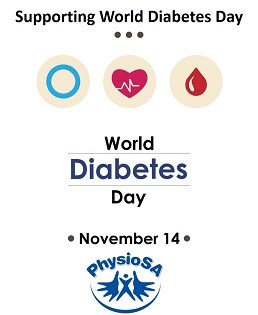
Sugar and spice and all things nice?
Why women need to know a simple secret to managing (and even preventing) diabetes on World Diabetes Day, 14 November!
What’s the biggest killer of women in South Africa? Some of us would guess TB, or perhaps cancer. But in fact, statistics released this year show that in 2015 (the last year analysed), diabetes was the number one cause of death for women in South Africa. It’s the second biggest cause of death overall, and has been creeping up through the top ten for several years, illustrating how critical it is for us as a country to beat this killer.
“You can see just how urgent this situation is when you compare these terrible South African stats with international statistics – globally, diabetes is still only the ninth biggest cause of death for women,” says Professor Witness Mudzi, who has just taken over as president of the South African Society of Physiotherapy. “This is why so many healthcare professionals support the initiative to tax sugar-sweetened beverages – one of the best things we can all do to fight the rapid growth of diabetes is to dramatically reduce the intake of added sugars in our diets. There is solid science linking the intake of sugar-sweetened beverages to diabetes.”
The theme of World Diabetes Day (WDD) 2017 – 14 November – is Women and Diabetes, with the slogan "Our right to a healthy future".
Why does the rising incidence of diabetes matter for women in particular?
• Around the world, two out of every five women with diabetes are younger – still in their reproductive years.
• In less advantaged communities, women and girls may have difficulty accessing diagnosis and treatment for diabetes.
• Women with diabetes have more difficulty conceiving.
• Their pregnancies may be more difficult.
• Gestational diabetes, a form of diabetes that arises during pregnancy, affects one in seven births – women who experience gestational diabetes often go on to develop Type 2 diabetes.
The International Diabetes Federation (IDF) is campaigning for affordable and equitable access for all women at risk of or living with diabetes to diabetes medicines and technologies and self-management education and information not only to have the best health possible with diabetes, but also to prevent developing Type 2 diabetes in the first place.
“That’s where physiotherapists come in,” says Professor Mudzi. “We are experts on exercise, and we know that one of the most powerful tools to prevent and manage diabetes is exercise.”
Exercise has huge benefits for diabetics:
• First of all, regular exercise actually decreases your risk of developing prediabetes (insulin resistance) and type 2 diabetes
• It reduces your risk of heart disease and stroke – one of the most important and potentially deadly consequences of Type 2 diabetes.
• It enhances your body’s sensitivity to insulin; since the key mechanism in Type 2 diabetes is resistance to insulin, this is very helpful
• Exercise improves other important factors such as blood pressure and joint pain
Crucially, exercise is a wonderful tool for controlling blood sugar. High blood sugar is toxic to the body; as 2013 research showed, “varying types, intensities, and durations of exercise generally lower blood glucose levels in most individuals, although exercise of longer duration is likely most effective.” (Blood Glucose Responses to Type, Intensity, Duration, and Timing of Exercise, Sheri R. Colberg et al, Diabetes Care October 2013)
What sort of exercise should South African women consider to prevent or manage diabetes?
“Try to be as active as possible throughout the day,” says Professor Mudzi. “The old sayings all apply: take the stairs rather than the lift, park as far away from the shop as possible, walk the dog every day. It doesn’t have to be heavy training at the gym: walking, swimming, even dancing, which is fun to do, are great aerobic exercise. It’s good to mix in a little strength training – lifting weights – as well.”
If you have concerns (perhaps you have some joint pains or old injuries), or haven’t engaged in exercise for some time, consult a physiotherapist, who can help you decide what sort of exercise will enhance fitness for you and be as pain-free and enjoyable as possible. “As physiotherapists, we know the best exercise programme is one you can enjoy and keep doing for the rest of your life,” says Professor Mudzi.
Back







